1. Life and Career
Francisco Suárez's life and career were marked by dedicated scholarship and extensive teaching across some of Europe's most prestigious academic institutions.
1.1. Early Life and Education
Francisco Suárez was born in Granada, Andalusia, in southern Spain, on January 5, 1548. He was the youngest son of a noble family; his father was the lawyer Gaspar Suárez de Toledo, and his mother was Antonia Vázquez de Utiel. After three years of preliminary studies, Suárez matriculated at the University of Salamanca in 1561 at the age of 13, initially studying law.
1.2. Entry into the Society of Jesus and Early Activities
In 1564, at the age of sixteen, Suárez entered the Society of Jesus in Salamanca. He underwent two years of intense spiritual training under the guidance of Father Alonso Rodriguez. In August 1566, Suárez took his first vows as a Jesuit. He then began studying theology at Salamanca in October 1566. Initially, he was not considered a promising student, failing his entrance exam twice and nearly abandoning his studies. However, after successfully passing the exam on his third attempt, his academic trajectory significantly improved. In March 1572, he was ordained as a priest in Segovia.
1.3. Major Teaching Career
Upon completing his theological studies in 1570, Suárez began his teaching career in philosophy, first as a scholastic tutor at Salamanca, and then as a professor at the Jesuit college in Segovia. He continued teaching philosophy in Segovia until September 1574, when he moved to the Jesuit College in Valladolid to teach theology, a subject he would continue to teach for the remainder of his life. His distinguished career involved teaching in a succession of prominent locations, including Ávila (1575), Segovia (1575), Valladolid (1576), Rome (1580-1585), Alcalá (1585-1592), and Salamanca (1592-1597). In 1597, he moved to Coimbra, Portugal, to assume the principal chair of Theology at the University of Coimbra. He remained there, with the exception of a brief period teaching in Rome, until his death in 1617. During his lifetime, Suárez was widely regarded as the greatest living philosopher and theologian. His reputation was so high that Pope Gregory XIII attended his first lecture in Rome, and Pope Paul V invited him to refute arguments put forth by James I of England, wishing to keep him close for his wisdom. Philip II of Spain also sent him to the University of Coimbra to enhance its prestige. When Suárez visited the University of Barcelona, the university's doctors came out to meet him wearing the insignia of their faculties, a sign of immense respect.
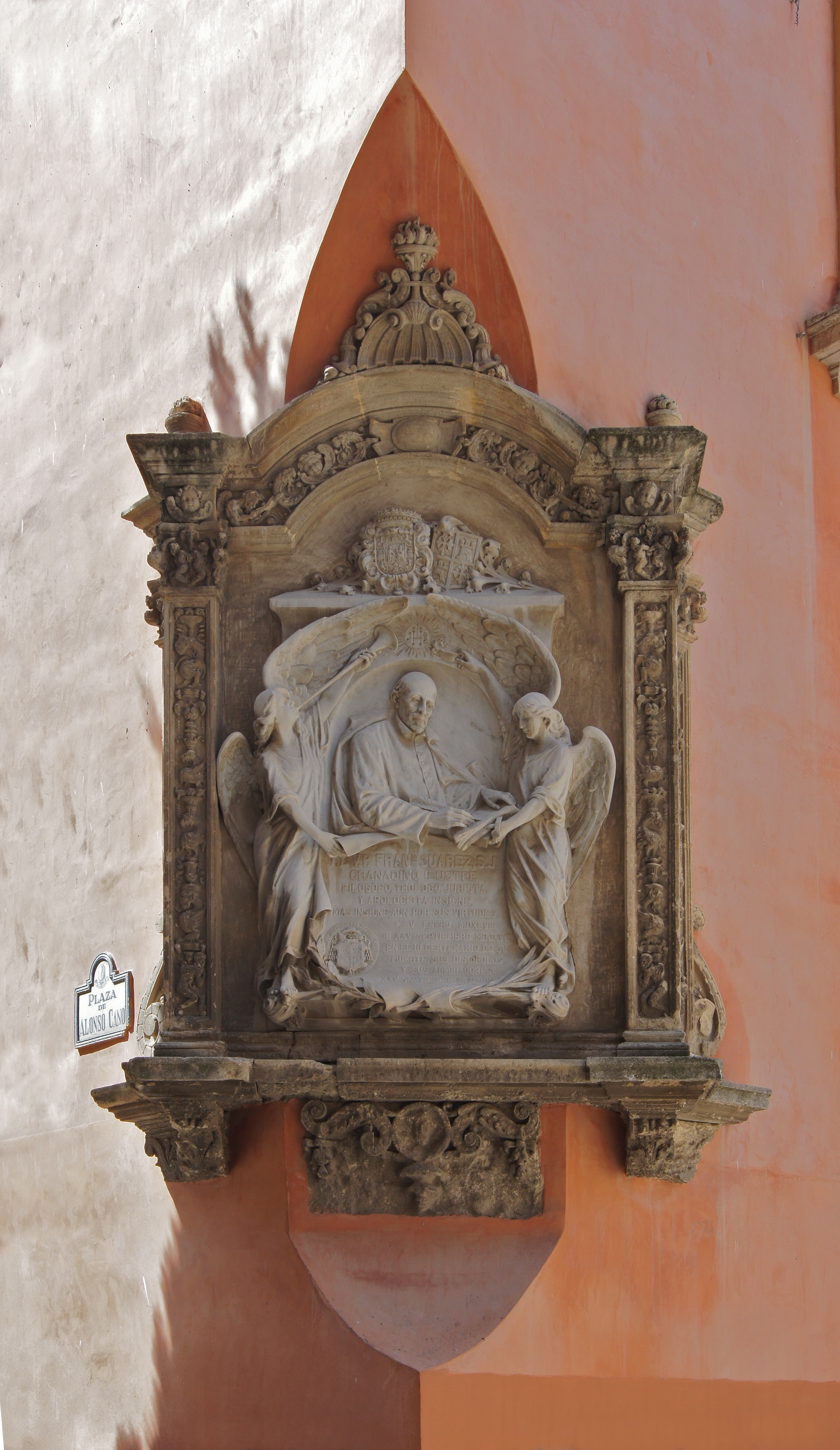
1.4. Later Life and Death
Suárez spent his later years primarily at the University of Coimbra. He wrote on a vast array of subjects, producing a substantial body of work, with his complete works in Latin totaling twenty-six volumes. His writings encompassed treatises on law, the relationship between Church and State, metaphysics, and theology. He died in Portugal on September 25, 1617, in either Lisbon or Coimbra. His library was sent to Ethiopia in the mid-17th century, though many books were lost, with some arriving in Portuguese Goa. He is buried in the Igreja de São Roque (formerly a Jesuit church) in Lisbon. After his death, his reputation continued to grow, and he directly influenced leading philosophers.
2. Major Ideas and Contributions
Francisco Suárez, affectionately known as the "Exceptional and Pious Doctor," made profound and systematic contributions to metaphysics, theology, and the philosophy of law. His work played a crucial role in synthesizing scholasticism while also laying groundwork for modern philosophical and legal thought.
2.1. Metaphysics
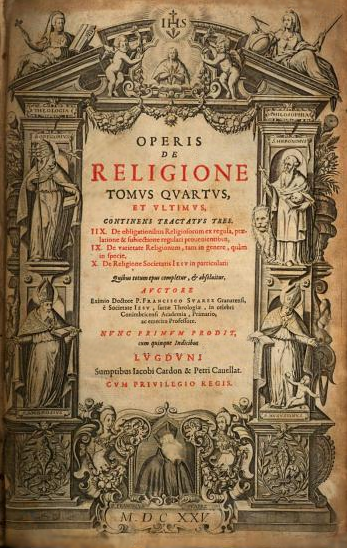
For Suárez, metaphysics was fundamentally the science of "real essences" and existence, primarily concerned with real being rather than conceptual being, and with immaterial rather than material being. He agreed with earlier scholastics that essence and existence are identical in the case of God, aligning with the ontological argument. However, he diverged from Thomas Aquinas and others by arguing that the essence and existence of finite beings are not truly distinct in reality, but rather are merely conceptually distinct. He contended that they are not really separable but can only be logically conceived as separate.
On the complex issue of universals, Suárez attempted to find a middle path between the realism of Duns Scotus and the nominalism of William of Occam. His position is somewhat closer to nominalism than that of Thomas Aquinas. While sometimes classified as a "moderate nominalist," his acceptance of "objective precision" (praecisio obiectiva) places him among moderate realists. He maintained that the only true and real unity in the world of existences is the individual; asserting that the universal exists separately ex parte rei would reduce individuals to mere accidents of one indivisible form. Suárez argued that although the humanity of Socrates does not differ from that of Plato, they do not constitute realiter one and the same humanity. Instead, there are as many "formal unities" (in this case, humanities) as there are individuals, and these individuals form an essential or ideal unity, not a factual one. This formal unity, however, is not an arbitrary creation of the mind but exists "in the nature of the thing, prior [ontologically] to any operation of the intellect."
His metaphysical work, particularly the Disputationes metaphysicae (1597), represents a remarkable effort of systematization, offering a comprehensive history of medieval thought by combining the three dominant schools of his time: Thomism, Scotism, and Nominalism. He also deeply commented on Arabic and high medieval works. Within this work, Suárez rigorously investigated being, its properties, and divisions, significantly influencing the subsequent development of theology within Catholicism. In the second part, Disputations 28-53, he established the distinction between ens infinitum (God) and ens finitum (created beings) as the most fundamental classification. Other corresponding distinctions include ens a se (being from itself) and ens ab alio (being from another), ens necessarium (necessary being) and ens contingens (contingent being), ens per essentiam (being by reason of its essence) and ens per participationem (being by participation), and ens increatum (uncreated being) and ens creatum (created being). He also distinguished between being as actus purus (pure actuality) and being as ens potentiale (potential being). In the final Disputation 54, Suárez discussed entia rationis (beings of reason), which are impossible intentional objects, conceptualized by the mind but unable to exist in reality.
His distinct metaphysical system, known as Suarism or Suarezianism, is characterized by several key principles:
- The principle of individuation is based on the proper concrete entity of beings.
- The rejection of the concept of pure potentiality in matter.
- The singular as the direct object of intellectual cognition.
- A conceptual distinction (distinctio rationis ratiocinatae) between the essence and existence of created beings.
- The possibility of spiritual substances being only numerically distinct from one another.
- The ambition for the hypostatic union (the union of divine and human natures in Christ) as the sin of the fallen angels.
- The Incarnation of the Word would have occurred even if Adam had not sinned.
- The solemnity of a vow is based solely on ecclesiastical law.
- The system of Congruism modifies Molinism by introducing subjective circumstances, place, and time as propitious to the action of efficacious grace, along with predestination ante praevisa merita (before foreseen merits).
- The possibility of holding the same truth through both science and faith.
- Belief in Divine authority is contained within an act of faith.
- The production of the body and blood of Christ through transubstantiation constitutes the Eucharistic sacrifice.
- The final grace bestowed upon the Blessed Virgin Mary is superior to that of all angels and saints combined.
2.2. Theology
In theology, Suárez aligned himself with the doctrines of Luis de Molina, a prominent Jesuit professor. Molina sought to reconcile the doctrine of predestination with the freedom of the human will and the predestinarian teachings of the Dominican Order. Molina argued that predestination is a consequence of God's foreknowledge of the free determination of human will, thus asserting that predestination does not negate human freedom. Suárez built upon this by developing "congruism," a mediating system. He maintained that while all individuals receive absolutely sufficient grace, the elect are granted a grace specifically adapted to their unique dispositions and circumstances. This tailored grace ensures that they infallibly, yet entirely freely, respond to its influence. This nuanced approach aimed to bridge the theological divide by emphasizing both divine sovereignty and human liberty.
2.3. Philosophy of Law
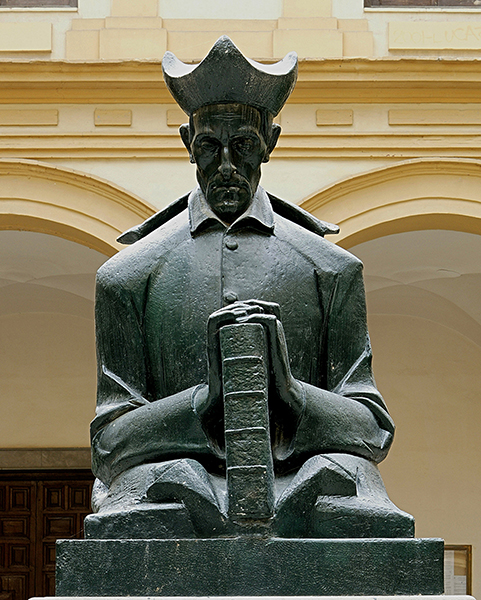
Suárez's contributions to the philosophy of law, particularly his work on natural law and the nature of positive law and monarchical authority, are highly significant. In his monumental work, Tractatus de legibus ac deo legislatore (Treatise on Laws and God the Legislator, 1612), he made a crucial distinction between natural law and international law, which he viewed as being based on custom. This distinction positioned him as a precursor to influential legal theorists like Hugo Grotius and Samuel von Pufendorf. Despite his scholastic methodology, he covered much of the same ground as these later thinkers, with Grotius acknowledging him with great respect.
The fundamental premise of Suárez's legal philosophy is that all legislative and paternal power originates from God, and the authority of every law ultimately stems from God's eternal law. However, Suárez vehemently rejected the patriarchal theory of government and the divine right of kings, doctrines that were popular in England and parts of Europe at the time. He argued against the form of social contract theory that later became dominant among early-modern political philosophers like Thomas Hobbes and John Locke. Nevertheless, some of his ideas, as transmitted through Grotius, found resonance in later liberal political theory, highlighting the complex and sometimes unintended influences of his thought.
Suárez argued that human beings possess a social nature bestowed upon them by God, which includes the inherent capacity to create laws. When a political society is formed, the authority of the state, while ultimately deriving its power from God, is understood to be of human origin in its specific form. This implies that the nature of state authority is chosen by the people, who then confer their natural legislative power upon a ruler. Crucially, Suárez posited that because the people grant this power, they retain the right to reclaim it and to revolt against a ruler. This right to revolt is contingent upon the ruler behaving unjustly towards the people, and such actions must be undertaken with moderation and justice. Specifically, the people must refrain from assassinating the ruler, regardless of how tyrannical he may become, if the ruler was legitimately chosen. However, if a government is imposed upon the people without their consent, Suárez argued that they have the inherent right to defend themselves by revolting against it, and, in such extreme cases, even to kill the tyrannical ruler.
While Suárez was deeply influenced by Aquinas in his philosophy of law, he introduced several notable divergences. Aquinas broadly defined "law" as "a rule and measure of acts, whereby man is induced to act or is restrained from acting." Suárez critiqued this as overly broad, arguing that it could apply to elements not strictly considered laws, such as unjust ordinances or counsels of perfection. Furthermore, Suárez took issue with Aquinas's more formal definition of "law" as "an ordinance of reason for the common good, made by him who has care of the community, and promulgated." He claimed this definition failed to acknowledge that law is primarily an act of will rather than solely an act of reason, and it would incorrectly categorize orders given to specific individuals as general laws. Finally, Suárez disagreed with Aquinas's assertion that God could alter or suspend certain secondary precepts of natural law, such as prohibitions against murder, theft, or adultery. Suárez maintained that natural law remains immutable as long as human nature itself does not change. What might appear as divinely-made changes in natural law, he argued, are merely alterations of the subject matter. For example, if God were to command something seemingly contrary to natural law, it would not be an exemption but a redefinition of the situation's context by divine authority.
In 1613, at the urging of Pope Paul V, Suárez wrote Defensio catholicae fidei contra anglicanae sectae errores (Defense of the Universal Catholic Faith Against the Errors of the Anglican Sect). This treatise was directed against the Oath of Allegiance demanded by James I of England from his subjects. In this work, Suárez argued that while the Pope is directly appointed by God, royal power originates from the people and is limited by conditions of the original contract and the purpose of maintaining the social community. He controversially asserted the supremacy of papal power over secular authority, implying that a heretical monarch (like a Protestant ruler) could be deposed or even killed by their subjects if necessary to uphold Catholic faith. This "radical ideology" of the Jesuits was criticized by figures like Thomas Hobbes in his Leviathan and became a pretext for harsh Roman Catholic oppression of Protestants and religious wars between Catholics and Protestants. King James I, himself a scholar, ordered Suárez's book to be burned by the common hangman and forbade its possession under severe penalties, complaining bitterly to Philip III of Spain for sheltering an declared enemy of the throne and majesty of kings. Consequently, his works were also banned or burned in France.
3. Major Works
Suárez was a prolific writer, and his extensive body of work played a crucial role in shaping scholastic thought for centuries. His complete works in Latin fill twenty-six volumes.
His principal writings include:
- De Incarnatione (1590-1592)
- De sacramentis (1593-1603)
- Disputationes metaphysicae (Metaphysical Disputations) (1597): This work, widely read across Europe in the 17th century, is considered by many scholars to be his most profound. It offers a systematic and comprehensive inquiry into the nature of being, its properties, and divisions, synthesizing various medieval philosophical traditions.
- De divina substantia eiusque attributis (1606)
- De divina praedestinatione et reprobatione (1606)
- De sanctissimo Trinitatis mysterio (1606)
- De religione (1608-1625)
- Tractatus de legibus ac deo legislatore (Treatise on Laws and God the Legislator) (1612): This massive work is foundational to his philosophy of law, establishing crucial distinctions between natural and international law and discussing the origins and limits of state authority.
- Defensio fidei catholicae et apostolicae adversus anglicanae sectae errores (Defense of the Universal Catholic Faith Against the Errors of the Anglican Sect) (1613): A highly controversial work defending papal authority and the right to resist tyrannical, non-Catholic rulers.
- De gratia (1619)
- De angelis (1620)
- De opere sex dierum (1621)
- De anima (1621)
- De fide, spe et caritate (1622)
- De ultimo fine hominis (1628)
Beyond these principal works, various editions and commentaries were produced throughout the centuries. For instance, his commentaries on Aquinas's theological works include:
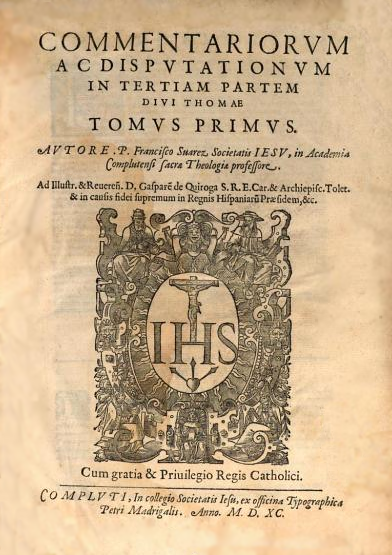
Later editions of his theological works, such as De incarnatione, also reflect his enduring influence:
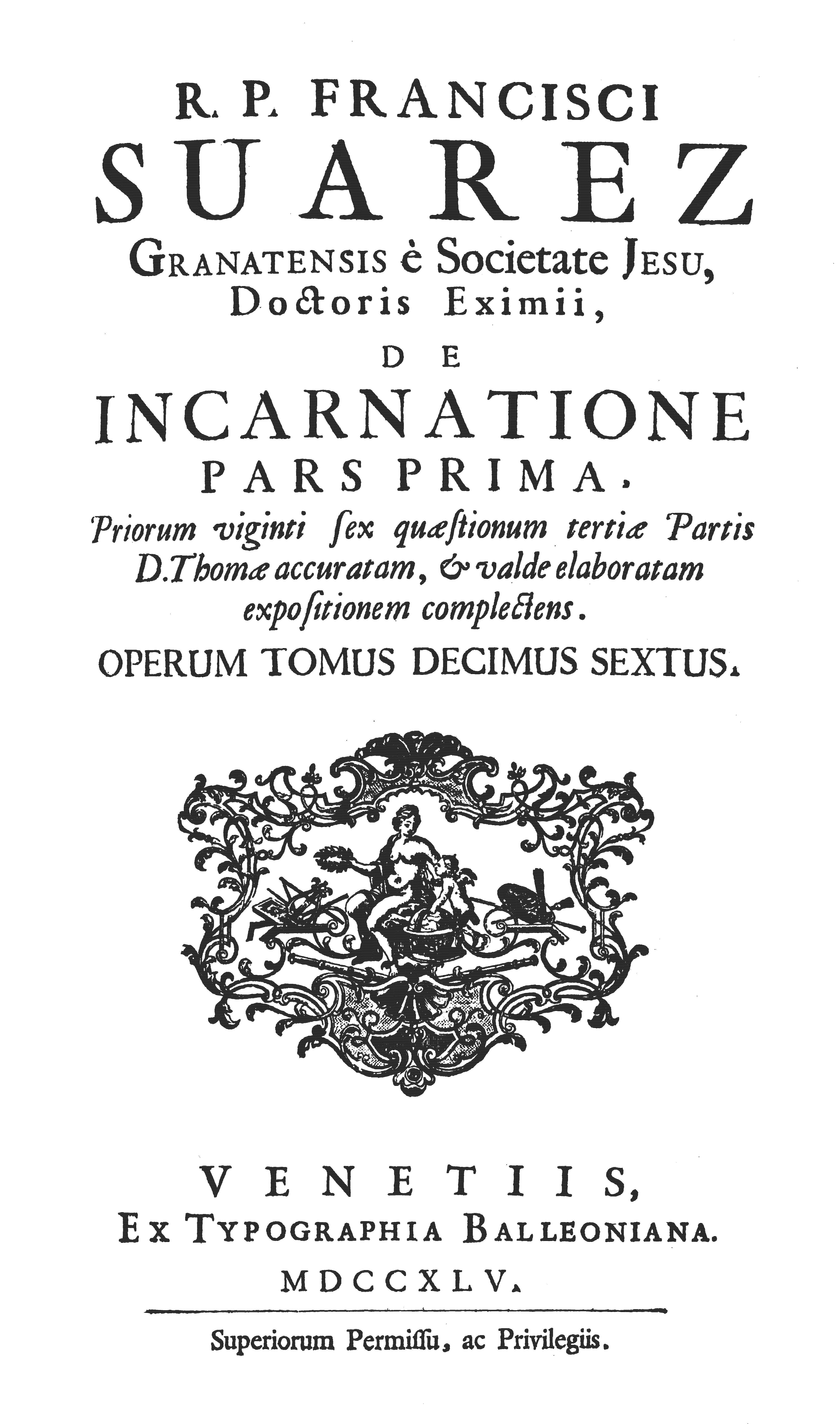
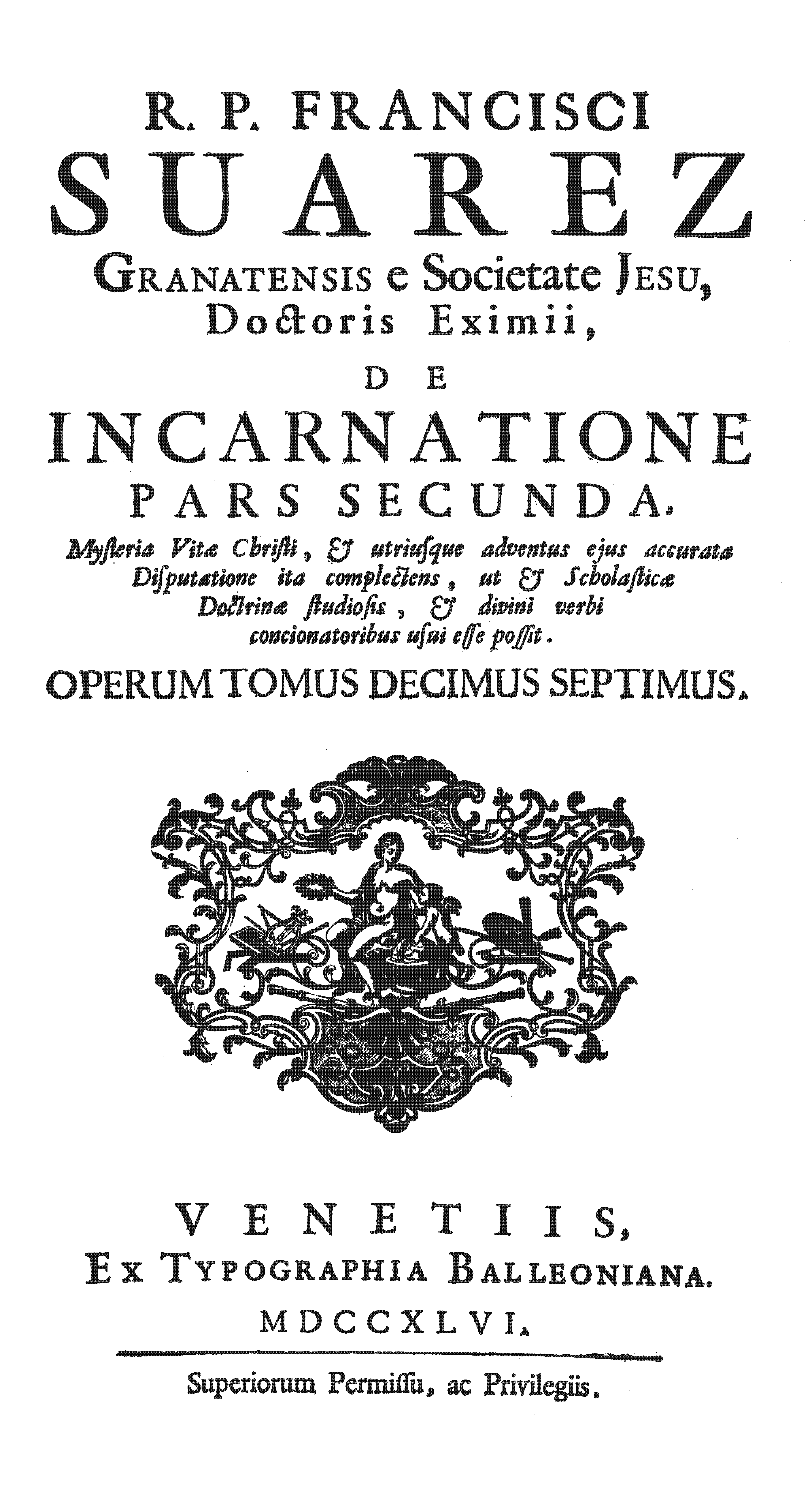
Between 1597 and 1636, the Disputationes Metaphysicae alone saw seventeen editions, demonstrating its profound influence. In the 18th century, a Venice edition of his Opera Omnia appeared in 23 folio volumes (1740-1751), followed by the Parisian Vivès edition, comprising 26 volumes plus two volumes of indices (1856-1861). Despite his historical importance, a modern edition of Suárez's complete works is not yet available, and only a few of his Disputations have been translated into English.
4. Assessment and Influence
Francisco Suárez's thought left an indelible mark on philosophical, theological, and legal discourse, both positively shaping subsequent developments and provoking significant criticism and controversy.
4.1. Positive Assessment and Influence
Suárez's contributions to metaphysics and theology exerted a significant and widespread influence on 17th and 18th-century scholastic theology, impacting both Roman Catholics and Protestants. Owing in part to the strength and extensive network of the Jesuit order, his Disputationes Metaphysicae was widely taught in Catholic schools across Spain, Portugal, and Italy. The text also spread to many Lutheran universities in Germany, where it was studied particularly by those who favored Philipp Melanchthon's approach to philosophy over Martin Luther's. In several 17th-century Lutheran universities, the Disputationes served as a foundational philosophy textbook.
Similarly, Suárez had a major influence on the Reformed tradition in German and Dutch academic institutions, particularly in metaphysics and law, including international law. His work was highly praised by figures such as Hugo Grotius (1583-1645), who is often considered the father of international law. His influence is clearly evident in the writings of prominent thinkers like Bartholomaeus Keckermann (1571-1609), Clemens Timpler (1563-1624), Gilbertus Jacchaeus (1578-1628), Johann Heinrich Alsted (1588-1638), Antonius Walaeus (1573-1639), and Johannes Maccovius (1588-1644). This pervasive influence prompted the Dutch Reformed theologian Jacobus Revius to publish his book-length response, Suarez repurgatus, in 1643. Suárez's De legibus was listed among the best law books by the Puritan Richard Baxter, and Baxter's friend, the jurist Matthew Hale, drew upon it for his own natural-law theory. Beyond the academic sphere, Suárez's influence extended to philosophers such as René Descartes, John Norris, Gottfried Leibniz, Christian Wolff, George Berkeley, and even indirectly to Immanuel Kant, demonstrating his broad impact across different philosophical traditions.
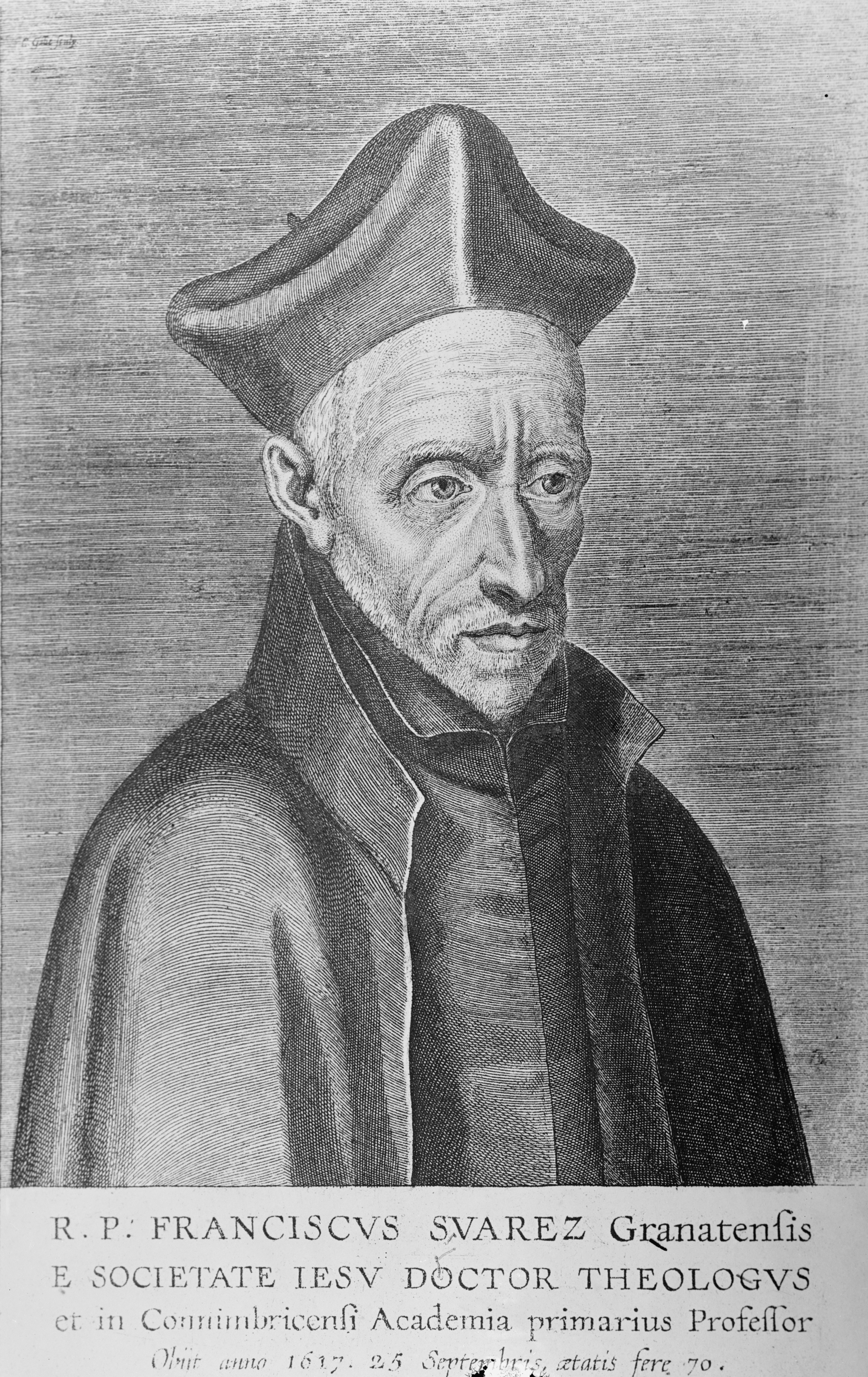
4.2. Criticism and Controversies
While Suárez garnered immense respect, his political and theological views also attracted substantial criticism and sparked significant controversies. His arguments regarding the human origin of political authority and his defense of tyrannicide rooted in popular dissent were vehemently opposed by the English philosopher Robert Filmer. In his work Patriarcha, Or the Natural Power of Kings, Filmer argued against the legitimacy of political power deriving from the people, instead promoting the concept of the Divine right of kings, which he traced back to Adam's paternal authority. Filmer viewed both Calvinists and Catholics like Suárez as dangerous opponents of absolute monarchy grounded in divine right, believing their ideas undermined the stability of monarchical rule.
Furthermore, Suárez's assertion in Defensio catholicae fidei that papal authority superseded that of secular rulers, and that subjects had a right to depose or even kill a heretical monarch, generated strong backlash, particularly from Protestant rulers. James I of England reacted by having the book publicly burned and forbidding its circulation under severe penalties, protesting to Philip III of Spain about hosting an declared enemy of royal authority. The Korean source also highlights that such "radical ideology" propagated by the Jesuits contributed to severe persecution of Protestants by the Roman Catholic Church and fueled religious conflicts between Catholic and Protestant factions. This demonstrates that while Suárez's ideas on limiting monarchical power resonated with later liberal theories, their application within a specific theological-political context could be highly divisive and contribute to violent conflicts. The philosopher Thomas Hobbes also criticized such Jesuit doctrines in his seminal work Leviathan, arguing against the dangers of divided sovereignty and the instability inherent in doctrines that justified resistance against established authority.